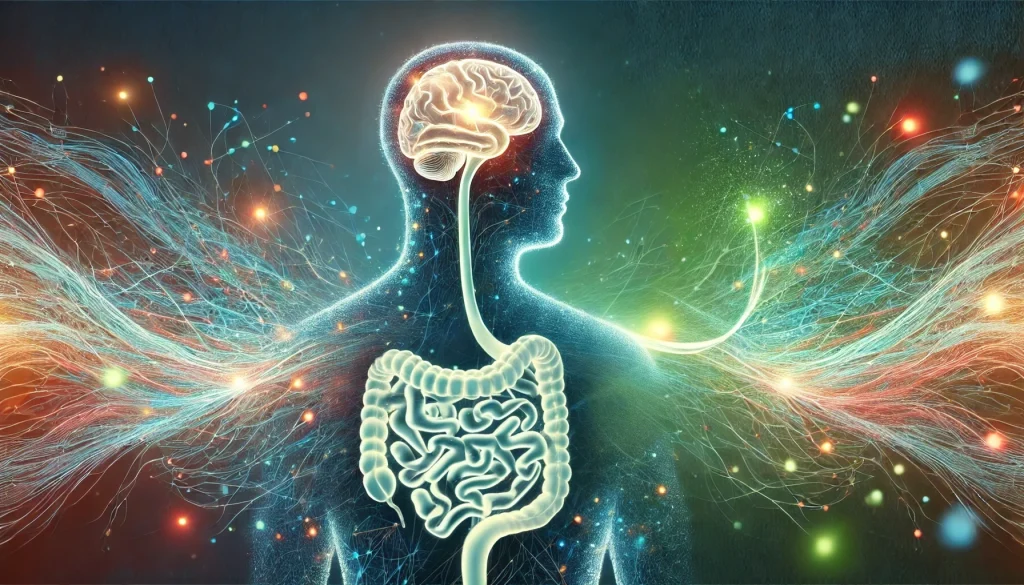Did you know that about 90% of the serotonin in our bodies—a key neurotransmitter that affects mood—is produced in the gut? It’s fascinating to think that the gut, often called our “second brain,” has such a profound impact on our mental health. As someone who has spent years helping individuals understand the connection between nutrition and mental well-being, I’ve seen the incredible power of gut health firsthand.
In this article, we’ll explore the intricate relationship between gut health and mental well-being, delve into the science behind it, and provide practical tips for improving your gut health to boost your mood.
How Important Is Gut Health for Mental Health?
Gut health is a cornerstone of mental health. The gut and the brain are connected through the gut-brain axis, a two-way communication network involving nerves, hormones, and biochemical signals. A healthy gut fosters a balanced mood, while an imbalanced gut microbiota can contribute to conditions like anxiety and depression.
I remember working with a young woman in her 30s who had been struggling with persistent anxiety. After dietary adjustments focused on improving her gut health, she reported feeling calmer and more emotionally stable within just a few weeks. This transformation solidified my belief in the gut’s impact on the brain.
Why Is Gut Health Important for Mental Health?
The importance of gut health for mental health lies in its dual role: as a producer of mood-regulating chemicals and as a modulator of inflammation. Here’s why it matters:
- Production of Neurotransmitters: The gut produces neurotransmitters like serotonin and dopamine, which are crucial for mood regulation. An unhealthy gut can lead to a deficiency, affecting mental health.
- Regulation of Inflammation: Chronic gut inflammation can trigger systemic inflammation, which is linked to depression and other mood disorders.
- Stress Response: A healthy gut can better manage the body’s response to stress, reducing cortisol levels (the stress hormone).
How Does Gut Health Affect Overall Well-being?
Gut health doesn’t just influence mental health—it affects your overall well-being:
- Immune Function: About 70% of the immune system resides in the gut. A healthy gut strengthens immunity, reducing the risk of infections and autoimmune diseases.
- Energy Levels: Proper nutrient absorption in the gut ensures that your body has the energy it needs to function optimally.
- Skin Health: Gut imbalances often manifest as skin issues like acne, eczema, or rosacea.
- Sleep Quality: The gut produces melatonin, a hormone essential for regulating sleep patterns.
How to Improve Gut Health for Mental Health
Improving your gut health can have a profound impact on your mood and overall mental well-being. Here are actionable steps:
- Adopt a Probiotic-Rich Diet: Incorporate fermented foods like yogurt, kefir, kimchi, and sauerkraut to introduce beneficial bacteria to your gut.
- Feed Your Gut with Prebiotics: Foods like bananas, onions, garlic, and asparagus provide the fiber that beneficial bacteria need to thrive.
- Reduce Processed Foods: Cut down on refined sugars and processed snacks, which disrupt gut microbiota balance.
- Stay Hydrated: Adequate water intake supports the mucosal lining of the gut and facilitates healthy digestion.
- Exercise Regularly: Physical activity encourages microbial diversity and promotes gut health.
- Manage Stress: Chronic stress negatively impacts the gut-brain axis. Practices like mindfulness, yoga, and deep breathing can help.
How to Improve Gut Health for Depression
Gut health plays a crucial role in managing depression. Here are tailored strategies:
- Targeted Probiotics: Research shows that specific strains, such as Lactobacillus and Bifidobacterium, can alleviate symptoms of depression by reducing inflammation and improving serotonin levels.
- Omega-3 Fatty Acids: These anti-inflammatory nutrients, found in fatty fish and flaxseeds, support gut and brain health.
- Limit Alcohol and Caffeine: Both substances can disrupt gut flora and exacerbate depression symptoms.
- Eat Anti-inflammatory Foods: Incorporate turmeric, ginger, and leafy greens to combat gut-related inflammation linked to depression.
The Gut Microbiota and Mental Health in Adults
The gut microbiota—the trillions of microorganisms in your gut—plays a pivotal role in mental health, especially in adults. Studies have shown:
- Microbial Diversity: A diverse gut microbiota correlates with better mental health outcomes, reducing the risk of anxiety and depression.
- Microbiota Dysbiosis: Imbalances in gut bacteria (dysbiosis) can increase inflammation and disrupt neurotransmitter production, affecting mood.
For adults dealing with chronic stress or aging-related mental health issues, maintaining a balanced microbiota becomes even more crucial.
Gut-Brain Connection Treatments
The gut-brain connection has opened doors to innovative treatments for mental health issues:
- Psychobiotics: These are probiotics specifically designed to improve mental health by modulating the gut-brain axis.
- Fecal Microbiota Transplants (FMT): Though still experimental, FMT involves transplanting healthy gut bacteria into patients to restore microbial balance.
- Dietary Interventions: Tailored diets, such as the Mediterranean diet, have been shown to improve gut health and reduce depression and anxiety.
My Personal Anecdote
Years ago, I faced a particularly stressful period in my life. Despite eating relatively well, I often felt anxious and irritable. After consulting with a colleague, I focused on improving my gut health by incorporating fermented foods, cutting down on sugar, and practicing mindfulness. Within a month, my mood stabilized, and I felt more energetic. This experience solidified my passion for educating others about the gut-brain connection.
Conclusion
The role of gut health in mental well-being cannot be overstated. From producing vital neurotransmitters to reducing inflammation and managing stress, a healthy gut is integral to a balanced mind. By adopting gut-friendly practices and understanding the gut-brain connection, you can take significant steps toward improving not only your mental health but your overall quality of life.
If you’ve been struggling with mood swings, anxiety, or depression, start by paying attention to your gut. It might just be the key to unlocking a happier, healthier you.



Pingback: How Art Therapy Helps with Stress Management - Wellness Readers Digest
Pingback: The Ultimate Guide to Emotional Wellness: How to Protect Your Mental Health - Wellness Readers Digest
Pingback: Gut Health and the Microbiome: The Key to Overall Wellness - Wellness Readers Digest